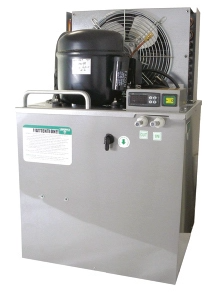Glycol chillers is one of the most efficient cooling technologies. Because of their precision control and their ability to resist low temperatures. Since the quality of the finished product depends on a precise level of cooling, glycol chillers are most frequently employed.
BENIFITS:
Safety Advantage
One of the frequent worries regarding refrigeration systems is the danger of leaks, which can increase temperatures and ruin crops. Since glycol contains inhibitors that make a system resistant to corrosion, scales, and rust, which can cause leaks and damage pipes, this particular factor is nonexistent with glycol chillers.
Propylene or ethylene acts as anti-refrigerants that prevent freezing inside coils. The glycol and water combination helps protect the chiller from the build-up of algae and bacteria.
Maintenance
Glycol chillers are safe because of their low maintenance requirements. Products can be stored in chillers to keep them fresh for a long time without the need for any kind of expensive maintenance.
Lengthy Pipes
Glycol chiller pipes can travel farther and deliver service from a single cooler and pump package to numerous processing locations.
Economizer Feature
Glycol chillers have an economizer feature that makes use of the cool air. The economizer function blends enough outside air to maintain the thermostat’s setpoint. A control switch shuts the compressor. Switch to using chilled outdoor air for cooling when the ambient temperature is suitable. This is a money-saving device built into most glycol chillers.
Cost Savings
A self-contained refrigeration unit can cost more than twice as much as a glycol chiller unit. Because it saves money by only requiring the purchase of one glycol chiller as opposed to multiple ones. Glycol and water are cooled by the chiller compressor alone, without the use of any additional parts or systems.
Low Temperatures
By adjusting the percentages of the glycol mixture, glycol chillers can work at temperatures well below the freezing point of water. A mixture of 10% ethylene glycol will freeze at 26°F, while a combination of 60% ethylene glycol will freeze at -60°F. Glycol’s antifreeze characteristics guarantee that the coolant will always be in a fluid state.

